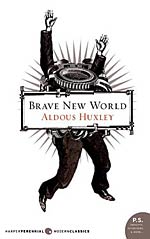
![]() Triseult
Triseult
3/24/2012
![]()
Growing up, I heard Brave New World often mentioned in the same breath as Nineteen Eighty-Four, which led me to believe one was the lesser version of the other. Rereading Huxley's dystopian version of the future, however, it seems like his Brave New World and Orwell's Big Brother are more like opposite sides of a coin. And while the vocabulary of Nineteen Eighty-Four is firmly implanted in our modern speech as a warning against the abuse of power and surveillance, there is little of Aldous Huxley's warning signs to guide us away from his view of dystopia; which is perhaps why we have stepped so much deeper into it in this day and age.
The citizens in Brave New World's futuristic London are far from unhappy; as a matter of fact, all of them have been engineered from their moment of inception and all throughout their growth in laboratories, to answer specifically to the needs of their class, and find happiness in that role. While the brilliant Alphas rule society and are bred to make decisions, the lower classes (Betas, Gammas, Deltas, all the way down to the "semi-moron" Epsilons) are increasingly stilted in their development to make them better-suited for their increasingly menial roles.
This world might appear dystopian, and if it were written in, say, the eighties, would come across as biting social satire. But as a product of the thirties, it is chillingly prescient. Brave New World spoke of institutionalized recreational drugs as a means of escape way before the invention of Prozac. It spoke of consumerism as a means of control long ago, when Wal-Mart was but a distant future.
A lot of Huxley's work was obviously written in opposition to his contemporary post-Victorian attitudes, and this is a big reason that makes the book at once prescient given our modern times, and at the same time less effective. For instance, the zipper, a symbol of decadence in Victorian times (due to the ease with which it allowed women to strip) is used profusely as an illustration of how promiscious women have become. One wonders what Huxley must have thought when Velcro came about.
Brave New World's protagonist and voice of reason is introduced later in the book, in the form of John, a "savage" who grew on a Native American reserve outside of civilization. John grew up reading Shakespeare, and has weird ideas that clash with civilization, such as the notion that men and women should love and marry, or that God demands suffering to infuse worth to life. While John probably worked well as a narrator to 1930's England, one is left with a sour taste from his rejection of society on the grounds that it rejects God, that it promotes free love, and that suffering and pain and disease are worth enduring to bring worth to life. In a world where we saw Heinlein's Stranger in a Strange Land become the credo of a generation, and comparing our condition to that of the turn of the century, it's difficult to find John the Savage's cause very sympathetic. It's easy to imagine him criticizing 2008 societies with the same venom, and although his points might merit consideration, they certainly fail at counterbalancing the dystopian society which he criticizes.
Overall, Brave New World is startingly prescient, and besides its protagonist, not that all dated. There is a certain lack of gravitas in the happy, oblivious lives of its citizens that makes it less of a warning sign than Orwell's rule of fear and paranoia; and perhaps this is the reason we see less of its vocabulary in every day use. But it is a timeless classic nonetheless, and the lessons and warnings it gives are every bit as valid and worthy of thought as Nineteen Eighty-Four.